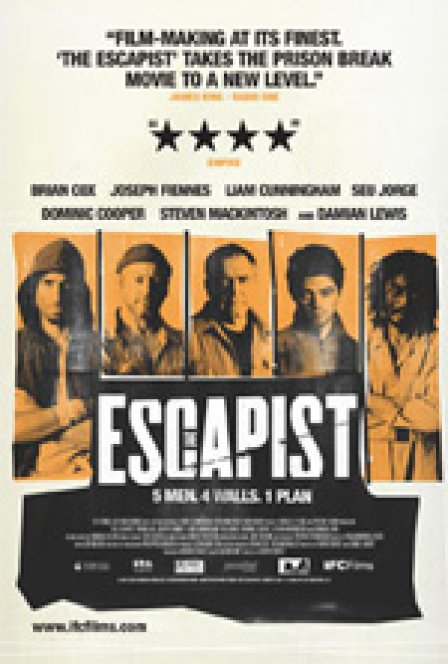The Escapist is a fast-paced, sweaty little fist of a movie. It’s a prison-break story, with an O. Henry twist at the end, providing the slightest oomph to an otherwise formulaic and boring plot. The problem is The Escapist refuses to open its fist, giving us stock characters who are left underdeveloped and a plot that’s overdeveloped. Prison-break movies often focus on the MacGyver ingenuity of inmates, rather than the personal stories. The Escapist offers only tiny morsels of exposition: Frank Perry (Brian Cox) as the faithless inmate, who is too old and too smart to hope for anything outside the four walls of his cell; Viv Batista (Seu Jorge, who probably shouldn’t quit his day job) as the ketamine chemist who deals drugs as well as library cards; Lenny Drake (Joseph Fiennes) as a very disgruntled boxer who could also pass for an Urban Outfitters model; James Lacey (Dominic Cooper) as the flesh/fresh meat for all them hungry wolves. The group of misfits come together and formulate a plan to break out of prison, which ain’t no Shawshank Redemption, but more like a white-washed Oz -- if Oz were set in Dublin.
Utilizing Foucault’s theory of surveillance and Bentham’s panopticon, director Rupert Wyatt emphasizes the prisoners’ gaze as they gather to communicate with their eyes and the rattling of cell bars across the massive prison lobby. Turning on Foucault’s theory, however, director Rupert Wyatt forgoes the role of the Guard and puts the inmates in charge of each other, with RZA, I mean, Rizza (Damian Lewis) acting as head thug. His junkie-rapist brother, Tony (Steven Macintosh), is hooked on ket, the drug of choice in this establishment, and he’s also hooked on ass, hence Lacey’s reason for breaking out. Tony threatens to tell Rizza about the escape plan, setting up a foil for the escapees. The relationship between Tony and Rizza is subtle yet significant, and it presents an unusual situation for a prison movie. What is it like to be locked up with family? In one of the film’s few standout scenes, Rizza punishes an inmate for supplying Tony with drugs by forcing the inmate to cut off his thumb. It is a papa bear Tony Soprano kind of way. Lewis is superb at striking a balance between sadistic cruelty and paternal care for his fuckup of a brother. It’s one of the few relationships in the film that feels authentic and brand new to the prison genre.
But Wyatt marginalizes the relationship between Rizza and Tony, and instead focuses the story on Frank. Cox delivers an intense performance, doing his best to beef up a role that’s rather meager. We know his daughter is a junkie and he has been ostracized from his family. Cox creates Frank out of tiny gestures — singing an Irish ballad as he falls asleep, a big brilliant smile at the camera when he finally reaches freedom — and he carries the film with his quasi-existential performance.
And so we have a film with a few standout performances, but nothing else to really carry it along. The direction feels contrived and clunky with a plethora of jump cuts and an annoying score that I assume is supposed give the film its “edge.” But it’s overkill. The bleak cinematography and dire setting is enough. Prison-break movies don’t need to play like video games. That’s why Escape From Alcatraz is such a classic: it’s the slow momentum that allows the dread and tension to build like mold on a prison wall, so that when the inmates do attempt to escape, the audience is just as nervous. But when the direction tries to compensate for a lacking storyline by appealing to 13-year-old kids, we’re left feeling indifferent as to whether or not the prisoners make it beyond those four walls.

